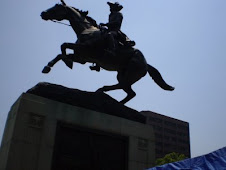I won't be visiting Pinsk, thanks
Even though my Russian grandmother, (known as bubbe) came from there.
I looked up the blasted place on Wikipedia because my grandmother's ancestral home seemed to have been moved from Russia to Belarus while staying in the same place. Apparently Pinsk was conveniently located for purposes of invasion, subjugation, and wholesale pogroms. Consequently, bubbe was fluent in Polish, Russian, and Yiddish.
Bubbe actually had nothing bad to say about the place. Mostly she talked about her memories of rowing down the river. She never mentioned her parents or siblings, possibly because they were executed by the Nazis.
In 1939, the population of Pinsk totaled 30,000, of whom 27,000 were Jews. Most of them were killed in late October 1942, after their deportation by the Nazis from the Pinsk ghetto.[3] Ten thousand were murdered in one day.
One detail of the Wikipedia entry interested me because bubbe had talked about it. She had an expression, in Khmelnytsky's tsiten, meaning a long, long time ago, not within living memory. She might have been referring to the days when dinosaurs roamed the earth, so remote were the events being mentioned.
Today I learned that this was a reference to Bohdan Khmelnytsky:
During the Cossack rebellion of Bohdan Khmelnytsky (1640), it was captured by Cossacks who carried out a pogrom against the city's Jewish population; the Poles retook it by assault, killing 24,000 persons and burning 5,000 houses. Eight years later the town was burned by the Russians.
Not a nice place to be a Jew. I won't be visiting.











2 comments:
They claim now, in Poland, that they expelled all 40,000 remaining Jews (in the 1950's) because "all Jews were communists".
Strangely enough, there were no communists in Pinsk in 1640 and still Jews were the targets of hatred - who woulda thought?
The smartest move my grandparents ever made was to get out of Pinsk.
Post a Comment